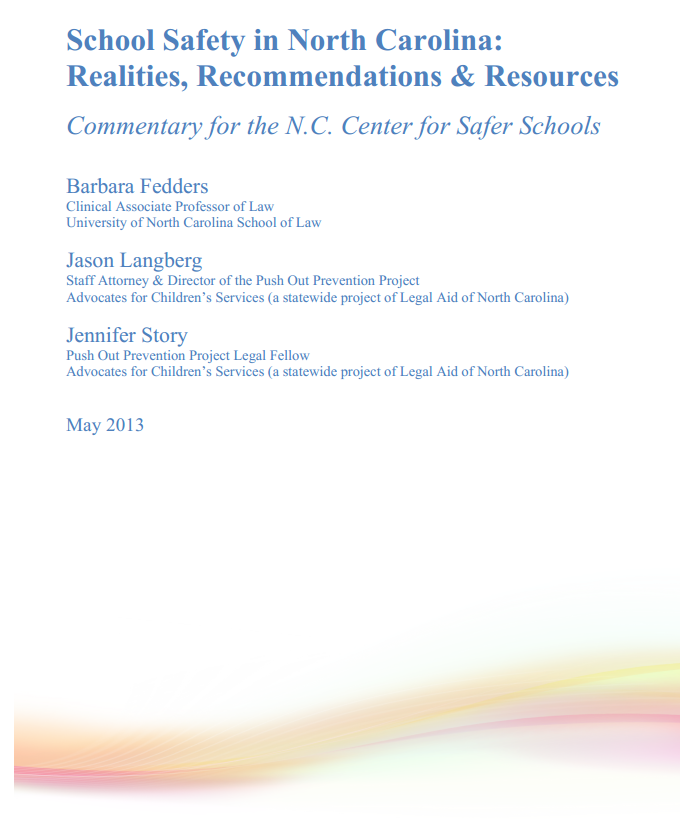Youth Justice Advocates Reject Excessively Punitive Measures, Call for Research-Based Approach to Ensuring Safe and Fair Schools
Resource type: News
Legal Aid of North Carolina | [ View Original Source (opens in new window) ]
 RALEIGH, N.C. – A new issue brief released today by youth justice advocates debunks common myths driving much of the school safety debate and provides a comprehensive, research-based approach to the issue. The brief is endorsed by 56 organizations in North Carolina and across the country.
RALEIGH, N.C. – A new issue brief released today by youth justice advocates debunks common myths driving much of the school safety debate and provides a comprehensive, research-based approach to the issue. The brief is endorsed by 56 organizations in North Carolina and across the country.
The issue brief was submitted to the N.C. Center for Safer Schools, a state program created in March 2013 that is currently seeking public comment on school safety issues. The authors, Barbara Fedders, a UNC law professor, and Jason Langberg and Jennifer Story, attorneys with Legal Aid of North Carolina’s Advocates for Children’s Services project, drafted the response out of concern that the school safety debate that has emerged following the tragedy in Newtown, Conn., is shortsighted, politically driven, unsupported by data and too narrowly focused on physical security.
“North Carolina’s students deserve thoughtful, comprehensive approaches to safety and well-being—not just politics and sound bites,” said Fedders.
To better inform the debate, the advocates present important and often-overlooked facts about school safety, recommendations for proven methods of ensuring student well-being, examples of reforms from other cities and states, and an extensive bibliography of literature on the issue.
Among the facts about school safety listed in the brief are the following:
- Schools are still among the safest places for children. Serious violence at schools is extremely rare. Children are more likely to be harmed at home or in the streets than in school.
- The presence of school resource officers (SROs)—law enforcement officers stationed full-time in schools—and other security personnel has increased dramatically in N.C. schools since the mid-nineties, despite an absence of credible evidence that they increase safety. What research shows is that the presence of school police has increased arrests and court referrals for minor misbehavior and led to some serious injuries to students.
- Too many students are experiencing out-of-school suspensions for minor misbehavior, a practice which negatively impacts school safety by alienating and frustrating struggling students, preventing students from receiving important services at school, and increasing opportunities for unsupervised students to socialize with negative peer influences.
- Too many students, especially Black students, are funneled into the juvenile system as a result of minor misbehavior, and students age 16 and older who are arrested at school or charged with a crime for something that happened at school are sent straight into the adult criminal system.
According to the advocates, true school safety efforts must aim to protect students’ psychological and emotional well-being as much as physical security, and must be built on a foundation of adequately funded schools and collaborative support from all systems—education, mental health, child welfare, juvenile justice—that serve youth.
Jason Langberg notes, “Our comments to the new N.C. Center for Safer Schools not only include recommendations for the most proven methods of ensuring school safety and order, but also strategies that will protect the mission of public schools, promote positive learning environments, and ensure fairness and dignity for students and their families.”
Some of the proposed strategies for promoting school safety include:
- focusing on preventing violence before it erupts by implementing research-based measures such as Positive Behavioral Interventions and Supports, smaller classes and schools, highly-trained teachers and staff, and parent involvement initiatives;
- developing a continuum of developmentally appropriate interventions for students that includes adequate numbers of support staff, peer mediation and conflict resolution programs, and non-punitive alternative schools and programs;
- limiting unnecessarily harmful “safety” measures by reducing out-of-school suspensions and ensuring SROs and other security personnel are well-trained, have a clearly defined role, and are accountable to students, parents, school staff and policymakers; and
- conducting an in-depth study of current school safety practices in North Carolina, and regularly collecting and publishing comprehensive data relevant to school safety.
Media contacts:
Barbara Fedders, UNC School of Law, 919-928-4770,fedders@email.unc.edu
Jason Langberg, Advocates for Children’s Services, 919-226-5901,jasonl@legalaidnc.org
Advocates for Children’s Services/Legal Aid of North Carolina is an Atlantic grantee via a re-grant from the NAACP Legal Defense Educational Fund.